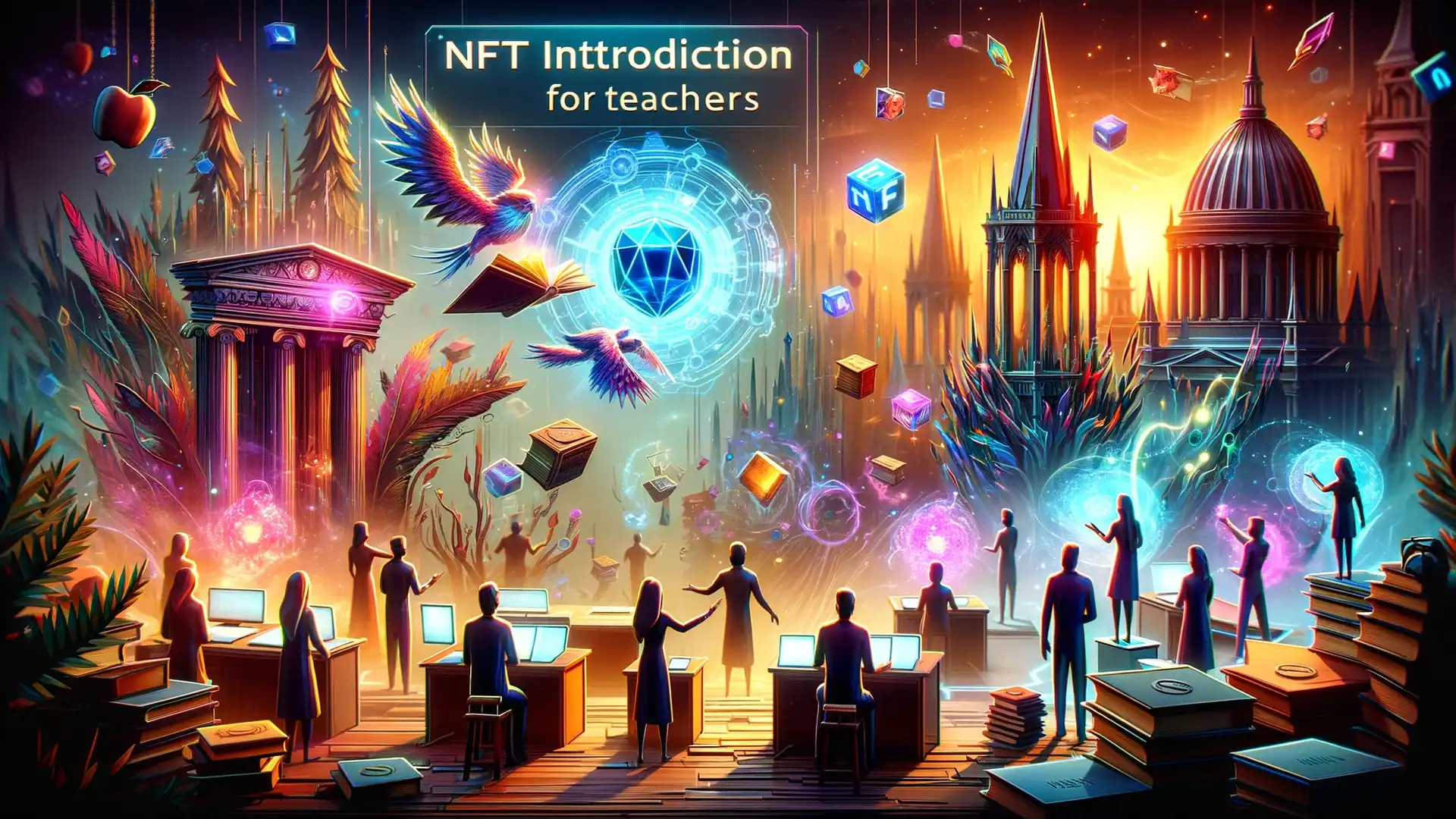How NFTs Are Transforming Educational Credentials and Accreditation Processes

 Author:
Artem Grigoriev
Author:
Artem Grigoriev
Reinventing Credentials: NFTs and the Future of Educational Records
In the evolving realm of education, Non-Fungible Tokens (NFTs) (unique digital assets that verify ownership and authenticity of unique items or content) are poised to revolutionize how we perceive, handle, and manage educational credentials comprehensively. This chapter delves deeply into the transformative potential of NFT technology . It provides a thorough foundational understanding. Supported by robust blockchain technology , NFTs function like digital certificates. They authenticate the true ownership of a digital or physical item. Blockchain records across multiple computers linked in a peer-to-peer network. This enhances security and transparency. The integration of NFTs into educational systems marks a significant milestone in the digital age. It alters how credentials are perceived, managed, and verified globally. This shift simplifies the verification process and increases confidence in the authenticity of records.
📘 This article complements: "The Complete Guide to NFT Credentials". Explore it to find answers to all your questions;)
By their inherent nature, NFTs ensure that each credential—whether a diploma, certificate, or detailed record of achievement—is tamper-proof and permanently verifiable . This is facilitated by blockchain's decentralized ledger system. It meticulously records each transaction or issuance. The process is immutable and cannot be altered. Once a credential is issued as an NFT, its authenticity and rightful ownership can be independently verified by anyone, anywhere. This eliminates the need for intermediary verification services. The immutable nature of blockchain provides a solid, reliable foundation. It ensures the trustworthiness and reliability of digital credentials. This innovation offers a compelling solution for credential verification issues and fraud prevention . It significantly enhances the overall security of personal academic data.
The security features of NFTs significantly bolster the integrity and security of academic records. By embedding credentials securely on a blockchain, educational institutions can protect against tampering, alteration, and forgery of official documents. Real-world applications of this cutting-edge technology are already demonstrating promising results. They effectively combat credential fraud. For example, a progressive university might issue diplomas as NFTs. These serve as indisputable, reliable proof of a student's academic achievements. They can be easily and instantly verified by potential employers or other educational institutions. Such innovative implementations not only enhance the reliability of academic credentials. They also improve their acceptance and recognition across various industries and international borders. This facilitates easier access for graduates to global opportunities .
Moreover, the issuance process of credentials via NFTs brings about enhanced efficiency and notable cost-effectiveness. The automation enabled by blockchain technology effectively eliminates manual processing errors. It significantly reduces the administrative burden. Credentials are updated and distributed in real-time. This simplifies the comprehensive management of academic records. It reduces overhead costs associated with traditional credentialing processes. The operational efficiencies gained through blockchain technology are significant. They drive down costs while increasing the speed and accuracy of issuing and managing credentials. This ultimately benefits educational institutions and students alike.
💡 Note: Blockchain technology not only makes credentialing processes more secure and efficient but also more transparent. This ensures that all stakeholders have access to verifiable, accurate, and up-to-date information. This level of transparency is crucial for maintaining accountability and trust among students, educational institutions, and employers.

The interoperability of blockchain platforms is another significant advantage. It facilitates a global standard for credentials that enables them to be recognized and accepted across different educational systems and international borders. This global recognition is particularly beneficial for students and professionals who move between countries or pursue opportunities in diverse regions. The widespread adoption of a standardized, blockchain-based credentialing system could eventually lead to a more interconnected and globally consistent educational framework. This eases the educational and professional mobility of individuals around the world.
NFT-based credentials also enhance accessibility, opening doors for learners everywhere. They provide easy access to verifiable and respected credentials, irrespective of geographical boundaries. This is especially important for remote learners or those in regions with less developed educational infrastructure. Ensuring that all students have equal opportunities to demonstrate their qualifications and competencies is crucial. This aspect of NFTs is particularly transformative. It democratizes access to quality education and credentials in an unprecedented manner. It breaks down barriers that traditionally hindered educational equality.
As we look to the future, the implications of integrating NFT technology into educational records are profound. Envision a world where educational credentials are universally recognized and accessible. Here, the authenticity of academic records is never in question. The administrative overhead of managing these records is significantly reduced. This vision is not only feasible but is gradually becoming a reality. More institutions begin to explore and adopt this technology. The potential of NFTs to transform educational records into secure, portable, and universally recognized assets is at the forefront of educational innovation. It sets the stage for a new standard in how educational achievements are recorded and recognized.
To conclude, the integration of NFTs in educational records heralds a new era of transparency, security, and efficiency. It challenges current paradigms and offers a robust solution to many of the existing issues within the educational sector. As educational leaders and policymakers consider these benefits, the potential for widespread adoption of blockchain technology in education becomes increasingly likely. The road ahead for blockchain in education is promising. It presents significant opportunities for institutions that are early adopters of this technology.
💡 Tip: For educational institutions looking to adopt blockchain technology, it's essential to start with pilot projects that target specific areas of credentialing. This approach allows for tangible demonstrations of benefits. It helps build the case for broader implementation. Engaging in pilot projects also allows institutions to refine their approach based on real-world feedback and operational insights. This ensures that the technology is adapted to best meet the needs of students and educators. This facilitates a smoother transition to new systems of credential management.

Navigating Challenges and Embracing Opportunities: NFTs in Academic Accreditation
In the dynamic, evolving landscape of education, Non-Fungible Tokens (NFTs) (unique digital assets that cannot be replicated, used to verify ownership and authenticity of specific items or content) are emerging as a powerful, transformative tool for academic accreditation. This chapter thoughtfully explores the complex interplay of challenges and opportunities associated with integrating NFT technology into academic systems. It provides a comprehensive roadmap for institutions eager to harness its full potential. As digital credentials become increasingly commonplace, the adoption of NFTs in academic settings signifies a major paradigm shift. It leads toward more secure, reliably verifiable records of academic achievements . This offers a streamlined, modern approach to handling educational certifications.
The integration of NFT technology in academic settings presents several formidable challenges, primarily around privacy, security, and technological adoption . Ensuring the privacy of student information remains paramount as institutions adopt blockchain technology. Blockchain distributes data across a network of computers rather than storing it at a single location. This enhances security and transparency. To effectively address these privacy concerns, robust encryption protocols are recommended. These methods secure data and privacy-enhanced blockchain models help in safeguarding sensitive data. They still benefit from the transparency and immutability of blockchain. Advanced cryptographic techniques, such as zero-knowledge proofs, address privacy concerns while maintaining blockchain's essential benefits. For further insights into securing blockchain while maintaining privacy, readers can explore resources like Understanding blockchain privacy .
Security is another critical challenge, given the heightened sensitivity of academic records. The decentralized nature of blockchain, the backbone of NFTs, offers enhanced security features. However, institutions must diligently implement comprehensive security measures to prevent unauthorized access and ensure system integrity. Additionally, regular security audits and adopting up-to-date cybersecurity practices are necessary. They safeguard against evolving threats in a digital-first environment and ensure that student data remains protected against potential cyber-attacks.
💡 Note: Successful implementation of NFTs in academic accreditation demands not only robust technology solutions but also a significant shift in organizational culture. Embracing digital transformation is crucial, and building a culture that values continuous innovation and education in digital technologies is important. This fosters an atmosphere that supports technological advancement and adaptation.

Highlighting the practical applications, the chapter details case studies from various educational institutions that have effectively implemented NFTs in their accreditation processes. For example, a forward-thinking university may use NFTs to issue and manage diplomas. This allows for instant verification of a graduate's credentials without intermediary checks. These case studies demonstrate not only increased efficiency and reduced fraud in credentialing but also improved traceability and global recognition of academic qualifications. Institutions like MIT have pioneered this innovative approach. They offer blockchain-based digital diplomas that streamline the verification process and enhance the portability of credentials, as seen in MIT's blockchain diploma project .
Looking to the future, NFTs hold the promise of revolutionizing educational models through customizable learning pathways . These digital tokens can represent individual courses or modules. They allow students to build a personalized curriculum that aligns with their career goals and educational needs. This flexibility could fundamentally change how credits are accumulated and transferred. It makes lifelong learning more accessible and recognized across different educational and professional platforms. This approach not only personalizes education but also enhances its relevance. It prepares students for the dynamic demands of the modern workforce.
In terms of actionable steps for institutions considering NFT-based systems, establishing interoperability among various educational technologies is crucial. This ensures that NFT-based credentials are recognized and valued universally. It facilitates seamless transitions for students across educational and professional landscapes. Moreover, implementing rigorous controls for personal data is essential to maintain trust and comply with global data protection regulations. Clear policies and transparent communication about how data is used and protected can help build trust and acceptance among students and faculty. This ensures a responsible approach to data management.
The chapter concludes by underscoring the importance of a strategic, informed approach to adopting NFT technology in academic accreditation. By understanding both the challenges and the significant opportunities it presents, educational leaders and policymakers can effectively navigate this digital transformation. This not only addresses immediate implementation concerns but also sets the stage for a more adaptive and innovative educational system. Emphasizing a proactive approach to digital adoption can facilitate a smoother transition. This enables educational institutions to stay ahead in a rapidly changing educational landscape.
💡 Tip: Educational institutions should consider forming partnerships with technology experts and legal advisors to ensure their adoption of NFT and blockchain technology aligns with best practices and compliance requirements. This paves the way for a successful digital transition. Collaboration with technology leaders can provide valuable insights into the practical challenges and solutions associated with implementing blockchain technologies in education. It ensures that institutions are well-equipped to handle both current and future challenges.

The Benefits of NFT-Based Credentials
Comparing NFT Credentials to Traditional Paper Credentials: Which Is Better and Why?
Types of NFT Credentials: Which One to Choose and Why?
The Power of NFT Rewards: Boosting Engagement and Loyalty in Education
Step-by-Step Guide to Creating, Issuing, and Implementing NFT Credentials
